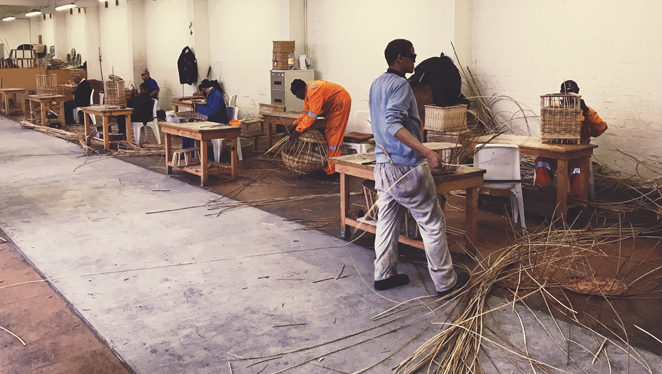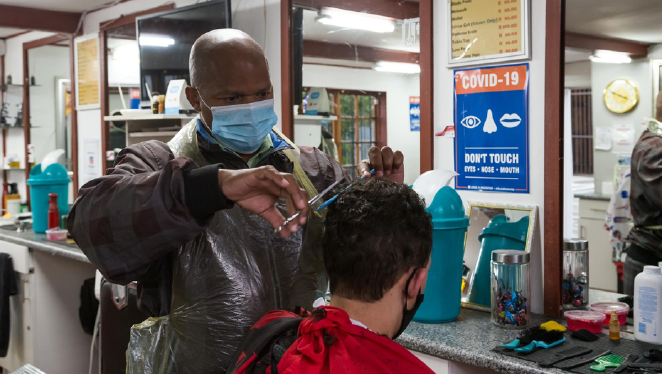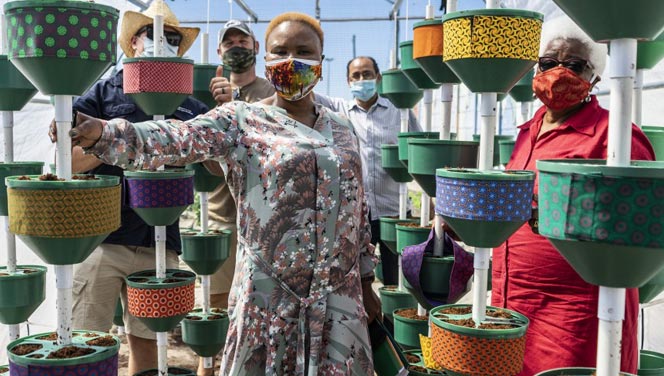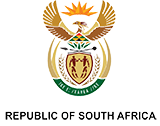Freeing small businesses
Government is helping small businesses deal with income losses incurred due to loadshedding. We have introduced the Energy Bounce Back Loan Guarantee Scheme (EBB) that will facilitate loans to Small and Medium Enterprises (SMEs) for investments related to rooftop solar generated energy.
Read more about the scheme here: Energy Bounce Back Scheme (pdf)

Informal traders in Mamelodi preparing stock after the revision of the regulation
We are supporting SMME participation in the manufacturing value chain, targeting specific products for manufacture for both the domestic and export markets. This includes providing business infrastructure support, financial assistance through loans and blended funding, facilitating routes to markets, and assistance with technical skills, product certification, testing and quality assurance.
We are reviewing the Business Act – alongside a broader review of legislation that affects SMMEs – to reduce the regulatory burden on informal businesses.
By the numbers
Between 2.4 and 3.5 million
SMMEs in South Africa
Over R900 million
Loans to SMMEs
20 000+
Small businesses supported
30 000+
Jobs created and sustained
Over R900 million
Injected into our economy by SMMEs
This benefitted an increasing number of enterprises owned by Black entrepreneurs and businesses owned by women, youth and people with disabilities.
Township and Rural Entrepreneurship Programme

This programme support SMMEs in townships and rural areas. It focuses on integrating opportunities in these areas into productive business ventures. The focus is to create platforms which provide the business support infrastructure and regulatory environment that enables entrepreneurs to thrive.
The following schemes are available for qualifying entrepreneurs:
Small-Scale Bakeries and confectioneries support programme
Autobody repairers and mechanics support programme (as well as small and independent auto-spares shops and informal automotive entrepreneurs)
Butcheries support programme
Clothing, leather and textiles support programme
Personal care support programme
Spaza-shop support programme
Tshisanyama and cooked food support programme
Learn more about how to apply for funding: Entrepreneurship programme
By the numbers
Over R200 million
Disbursed
6 000+
Enterprises supported
8 000+
Jobs created/maintained
Support for co-operatives
Co-operatives are a mechanism through which communities can organise themselves to participate more meaningfully in the economy.
The Co-operatives Development Support Programme (CDSP) supports co-operative enterprises financially and non-financially. It prioritises co-operatives owned by prioritises women, youth and persons living with disabilities, especially in rural, township and peri-urban areas.
In partnership with other institutions, the programme offers blended financing to eligible co-operatives on cost-sharing funding of a combination of a grant and loan. The grant funding portion of funding is capped at R2.5 million towards qualifying activities.
Find out how to apply: Co-operative-development-support-programme.pdf
By the numbers
Over R10 million
Disbursed
30
Co-operatives supported
Women-owned businesses

We have put a national policy in place to ensure that 40% of public procurement goes to women-owned businesses and trained around 6 000 women-owned businesses in essential business skills to apply for government tenders.
Government is working to pilot the Women’s Empowerment Fund. This initiative will accelerate the financial inclusion of women, youth and people with disabilities across mainstream sectors of our economy.
The IDC has earmarked approximately R9 billion to invest in women-led businesses to drive inclusive economic growth. Other entities including the Public Investment Corporation and the National Empowerment Fund have also committed to establish special purpose vehicles to support women-owned businesses.
By the numbers
3 400+
Women–owned enterprises trained
R9 billion
IDC investment for women–led businesses
In the media
Ramaphosa declares woman-owned business the big ticket for govt procurement
President Cyril Ramaphosa expressed little satisfaction with the degree to which government was supporting woman-owned businesses through state procurement and said this needed to be ramped up significantly.
News24
IDC unveils new fund to empower and elevate SMMEs
The Industrial Development Corporation of South Africa (IDC) is excited to introduce its ground-breaking initiative that embodies the spirit of growth and innovation – the IDC credit facility to non-bank intermediaries.
moneyweb.co.za

